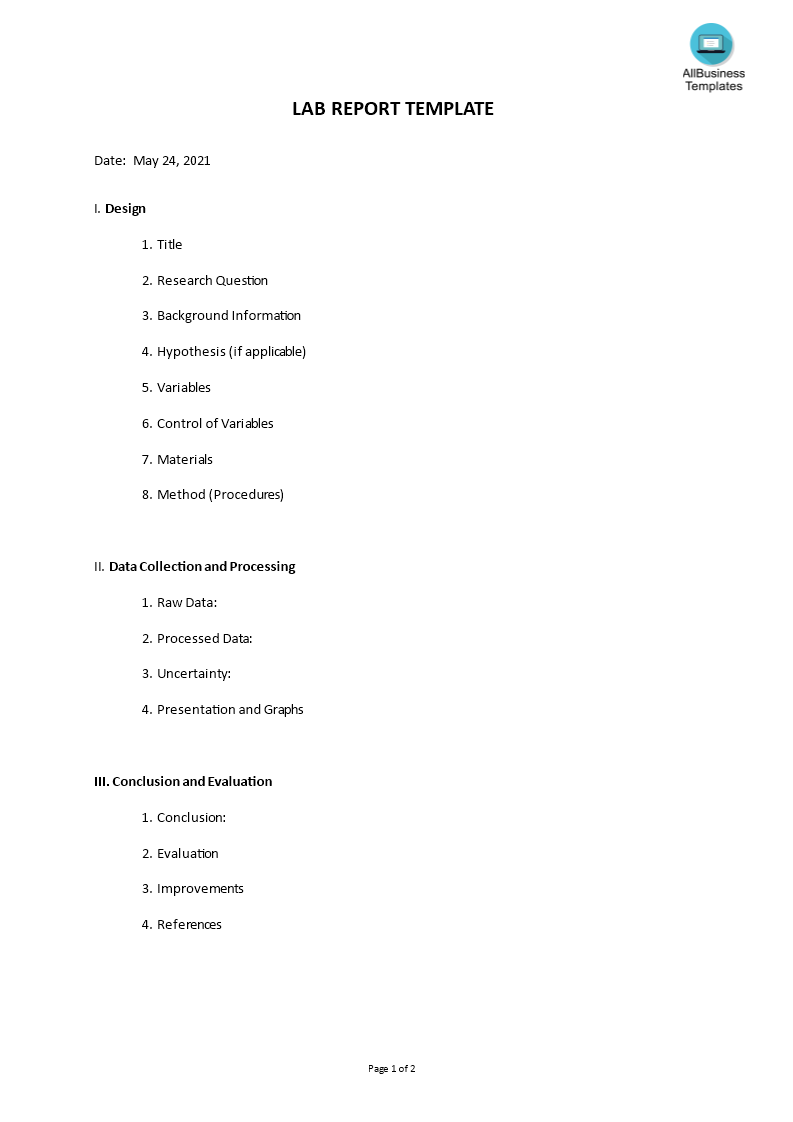Lab Report Template
Sponsored Link免费模板 保存,填空,打印,三步搞定!

Download Lab Report Template
微软的词 (.docx)免费文件转换
- 本文档已通过专业认证
- 100%可定制
- 这是一个数字下载 (64.57 kB)
- 语: English
Sponsored Link
How do you write a lab report? We provide a formal Lab Report format that fits your needs!
In a professional career in the lab, it often is required to make an academic or professional lab report. Research or lab reports serve several functions, depending on the purpose. They may be used to communicate information within an organization upwards to senior management, downwards to staff, or externally to government regulators. They can be informative or persuasive in nature, for example, to get the management or project board motivated to take the desired action, support a project, or approve an investment decision.
This formal lab report handout will provide you with an outlined structure for writing reports. The following steps are important to follow when composing your report:
- Preparing and planning: the audience and the purpose
- Periodic reports;
- Progress reports;
- Investigative reports;
- Recommendation reports;
- Feasibility reports.
- Telling or selling: informational vs. analytical reports
- Constructing the message: the report structure
- Caring for your reader: empathetic vs. selfish writing
- Using effective language: formality, jargon, and details
- Delivering the message to the reader: indirect vs. the direct method
- Enhancing readability: Using headings, transitions, and graphics
- Identify the purpose of the report
- Make sure you understand the wishes and needs of your audience;
- Understand the difference between informational and analytical reports;
- Develop an effective report format, before you start writing the content;
- Decide on what language and level of detail is appropriate for your target audience;
- Apply an appropriate degree of formality to your report, and keep it consistent;
- Determine if the direct or indirect method is appropriate for your target audience;
- Create headings, transitions, and graphics to enhance your report’s readability;
- Arrange proofreading of the report before sending it to the final readers.
Lab Report Format
Design
1. Title
2. Research Question
3. Background Information
4. Hypothesis (if applicable)
5. Variables
6. Control of Variables
7. Materials
8. Method (Procedures)
Data Collection and Processing
1. Raw Data
2. Processed Data
3. Uncertainty
4. Presentation and Graphs
Conclusion and Evaluation
1. Conclusion
2. Evaluation
3. Improvements
4. References
As you know, communicating in a professional manner will get you respect and will bring you new opportunities in life and business. Therefore, we support you by providing this Lab Report template and you will see you will save time and increase your effectiveness. Please note this template is provided for guidance only and should be edited to fit your personal situation.
Download this Lab Report template now.
DISCLAIMER
Nothing on this site shall be considered legal advice and no attorney-client relationship is established.
发表评论。 如果您有任何问题或意见,请随时在下面发布
相关文件
Sponsored Link

